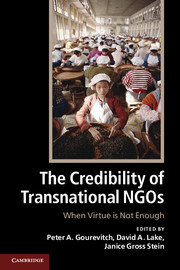5 - Dilemmas of information and accountability
foreign aid donors and local development NGOs
from Part II - Humanitarian NGOs
Published online by Cambridge University Press: 05 June 2012
Summary
Introduction
On a busy street in Sopocachi, a fashionable neighborhood of Bolivia’s capital city La Paz a few blocks from the embassy district, there is a large well-maintained building housing the main offices of a prominent health care NGO called PROCOSI. Like many thriving NGOs in developing countries, PROCOSI has been very successful at obtaining grants from international donors like the United States (through USAID) and the European Union, as well as grants from the government of Bolivia and international NGOs like CARE and Save the Children. With this funding, PROCOSI runs health care programs all across Bolivia. The office is staffed by well-educated, relatively well-off Bolivians and shares many features with offices of the major aid agencies in La Paz: it is comfortable and professional, glossy posters and brochures detailing successful projects and pictures of those in need adorn the walls, and professionally dressed staff members work at computers.
NGOs like PROCOSI have become increasingly important middlemen for the delivery of aid in developing countries. Since the 1980s, most foreign aid donor organizations (both governmental and private, multilateral and bilateral) rely on grassroots NGOs in developing countries to help carry out their projects. Using local NGOs as service providers is seen as beneficial to donors for several reasons. First, since grassroots NGOs are based in the communities they serve, they are thought to have access to local knowledge about what types of projects are most needed, and have the know-how to effectively carry them out. Second, supporting local NGOs is seen as good for civil society and good for democracy because these organizations promote community involvement and democratic participation. More fundamentally, grassroots NGOs are seen as virtuous. Like other nonprofits, they are seen as mission-driven organizations with goals that are a natural fit for foreign aid donors, including things like sustainable development, empowering women, educating children, or improving access to health care. And, because of their non-governmental, not-for-profit, and issue-centered nature, they are seen as having common interests with donors, making them more trustworthy and less prone to corruption than governments or businesses involved in similar services.
- Type
- Chapter
- Information
- The Credibility of Transnational NGOsWhen Virtue is Not Enough, pp. 115 - 136Publisher: Cambridge University PressPrint publication year: 2012
- 6
- Cited by

